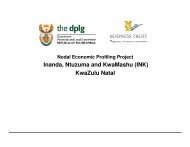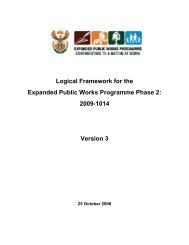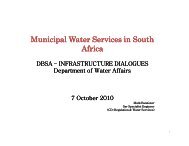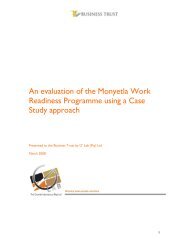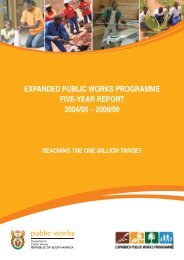National Infrastructure Maintenance Strategy - Construction Industry ...
National Infrastructure Maintenance Strategy - Construction Industry ...
National Infrastructure Maintenance Strategy - Construction Industry ...
Create successful ePaper yourself
Turn your PDF publications into a flip-book with our unique Google optimized e-Paper software.
insufficient budgets and for other reasons given<br />
below, the maintenance backlog of some<br />
provincial departments is escalating.<br />
State of infrastructure and state of maintenance<br />
With a few exceptions, provincial governments<br />
have not done formal broad-based audits of the<br />
state (i.e. condition) of their health and education<br />
facilities. Particularly lacking are overviews of<br />
trends in the state and performance, and<br />
maintenance, of provincial health and education<br />
facilities.<br />
Investigations undertaken by the CSIR on behalf of<br />
provincial governments indicate that a lack of<br />
maintenance is in many instances hampering<br />
health and education service delivery. For<br />
example, the condition of much hospital<br />
mechanical and electrical equipment has<br />
deteriorated, which is leading to unacceptably high<br />
rates of equipment failure in service. An especially<br />
stark consequence of maintenance not being<br />
addressed is a shortening of the lives of the<br />
facilities, and hence the need for them to be<br />
replaced sooner.<br />
The four principal causes of the ongoing failure of<br />
some provincial government departments to catch<br />
up on maintenance backlogs and to run a<br />
preventative maintenance programme are:<br />
• Emphasis being laid on capital works to<br />
construct new facilities, but inadequate<br />
measures to maintain these once they are built;<br />
• new facilities often not designed for low<br />
maintenance, and also sometimes poorly built;<br />
• inadequate maintenance budgets, because<br />
maintenance is not prioritised in the planning<br />
and budgeting process; and<br />
• inadequate skills (especially technical skills)<br />
and experience to plan and implement<br />
appropriate maintenance programmes.<br />
The shortage of skills in the provincial government<br />
departments responsible for commissioning and<br />
controlling facilities is in many instances<br />
manifesting in delays in planning and initiating<br />
work, in poor selection of consultants and<br />
contractors, and in poor supervision of work. In<br />
some provinces, difficulties also arise between the<br />
institutions responsible for maintenance (often the<br />
provincial Departments of Works) and the client<br />
institutions (for example Departments of Health<br />
and Education).<br />
Current initiatives to enhance maintenance<br />
Thanks to good programme planning and targeted<br />
investment, facilities in some provinces have<br />
improved over the last 10 years (for example<br />
KwaZulu-Natal and Limpopo), while there is strong<br />
evidence to suggest that their condition is sliding<br />
in others.<br />
The <strong>National</strong> Department of Education is driving<br />
the compilation of a nation-wide schools "register<br />
of needs". While this will contain other information<br />
not directly related to maintenance needs, it will<br />
include also asset and asset condition registers,<br />
and will thus be very useful for assessing and<br />
prioritising education facilities maintenance<br />
needs. Completion of this register is scheduled for<br />
before the end of the 2006/2007 financial year.<br />
<strong>National</strong> guidelines on facilities management, that<br />
provincial governments should follow, are also<br />
needed.<br />
A nation-wide survey of health facilities needs,<br />
much less comprehensive than the schools<br />
register of needs will be when it is completed, was<br />
undertaken about 10 years ago, and a new survey<br />
is long overdue.<br />
<strong>National</strong> Treasury recently established the<br />
"Hospital Revitalisation Fund", a capital grant<br />
programme for the upgrading of hospitals and the<br />
building of new ones. The revitalisation process<br />
does require provinces to include budget provision<br />
for hospital facilities maintenance, but the level<br />
that has been set is too low. Nevertheless it has<br />
succeeded in improving much hospital<br />
infrastructure where other programmes have<br />
failed - and the reasons for its success are<br />
principally that it is a dedicated fund and that it is<br />
monitored by <strong>National</strong> Treasury and the national<br />
Department of Health.<br />
national infrastructure maintenance strategy<br />
20





